Huazhong University Research Inquiry: Chinese MNCs in Africa
VerifiedAdded on 2023/04/17
|62
|11256
|123
Report
AI Summary
This research report, conducted by a student, investigates the management issues faced by Chinese Multinational Corporations (MNCs) operating in the African market. The study focuses on the conflicting leadership styles between Chinese authoritarianism and African liberal and humanitarian approaches, which impact workforce performance. It explores how biased management structures within Chinese MNCs affect the integration of skilled African personnel. The research uses a mixed-method approach, combining quantitative surveys with 50 respondents and qualitative interviews with 3 participants. Findings reveal a significant impact of diversity and inclusion on organizational outcomes. The conclusion offers recommendations for improving organizational culture and productivity, linking the findings to the research objectives. The report includes an abstract, table of contents, literature review, methodology, findings, and conclusion with references and appendices.
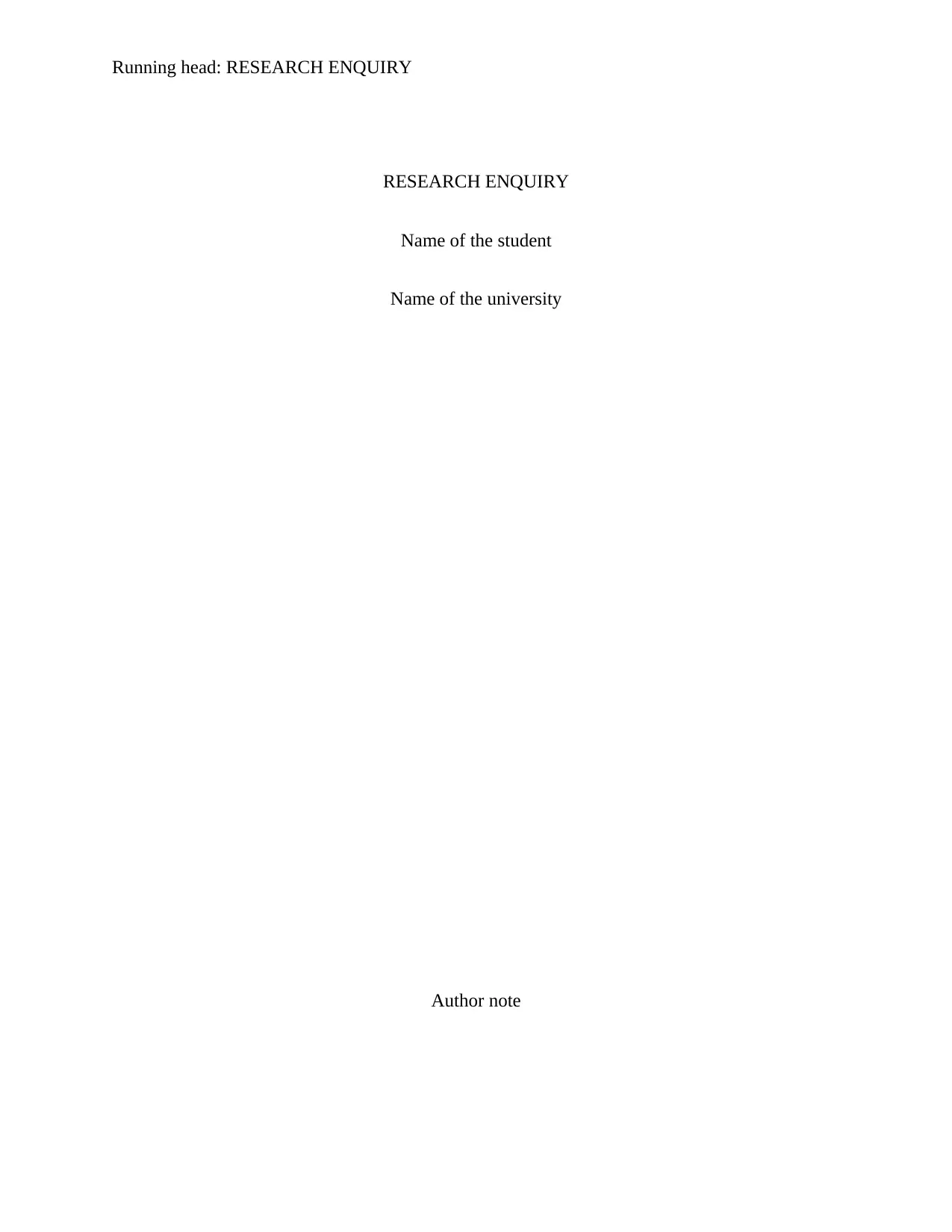
Running head: RESEARCH ENQUIRY
RESEARCH ENQUIRY
Name of the student
Name of the university
Author note
RESEARCH ENQUIRY
Name of the student
Name of the university
Author note
Paraphrase This Document
Need a fresh take? Get an instant paraphrase of this document with our AI Paraphraser
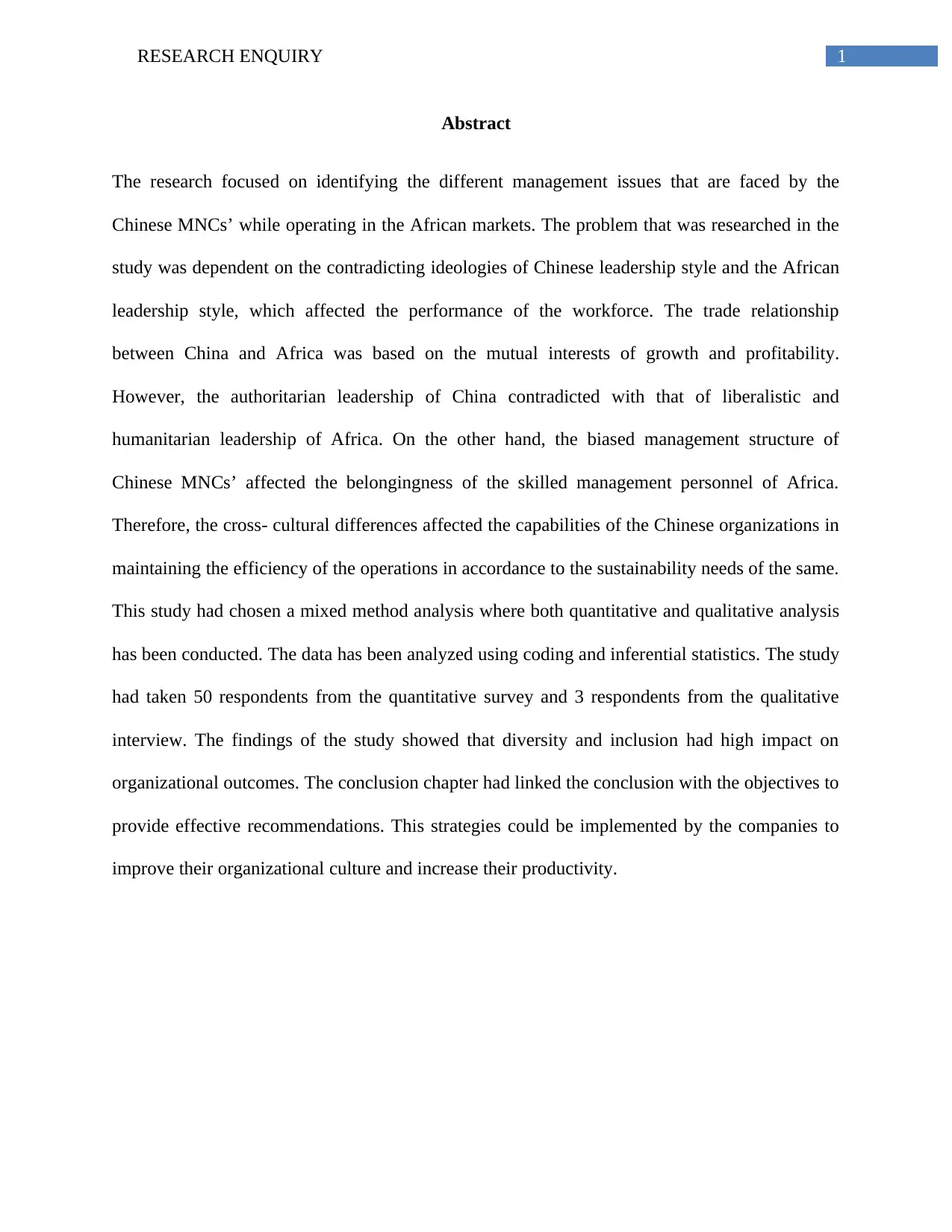
1RESEARCH ENQUIRY
Abstract
The research focused on identifying the different management issues that are faced by the
Chinese MNCs’ while operating in the African markets. The problem that was researched in the
study was dependent on the contradicting ideologies of Chinese leadership style and the African
leadership style, which affected the performance of the workforce. The trade relationship
between China and Africa was based on the mutual interests of growth and profitability.
However, the authoritarian leadership of China contradicted with that of liberalistic and
humanitarian leadership of Africa. On the other hand, the biased management structure of
Chinese MNCs’ affected the belongingness of the skilled management personnel of Africa.
Therefore, the cross- cultural differences affected the capabilities of the Chinese organizations in
maintaining the efficiency of the operations in accordance to the sustainability needs of the same.
This study had chosen a mixed method analysis where both quantitative and qualitative analysis
has been conducted. The data has been analyzed using coding and inferential statistics. The study
had taken 50 respondents from the quantitative survey and 3 respondents from the qualitative
interview. The findings of the study showed that diversity and inclusion had high impact on
organizational outcomes. The conclusion chapter had linked the conclusion with the objectives to
provide effective recommendations. This strategies could be implemented by the companies to
improve their organizational culture and increase their productivity.
Abstract
The research focused on identifying the different management issues that are faced by the
Chinese MNCs’ while operating in the African markets. The problem that was researched in the
study was dependent on the contradicting ideologies of Chinese leadership style and the African
leadership style, which affected the performance of the workforce. The trade relationship
between China and Africa was based on the mutual interests of growth and profitability.
However, the authoritarian leadership of China contradicted with that of liberalistic and
humanitarian leadership of Africa. On the other hand, the biased management structure of
Chinese MNCs’ affected the belongingness of the skilled management personnel of Africa.
Therefore, the cross- cultural differences affected the capabilities of the Chinese organizations in
maintaining the efficiency of the operations in accordance to the sustainability needs of the same.
This study had chosen a mixed method analysis where both quantitative and qualitative analysis
has been conducted. The data has been analyzed using coding and inferential statistics. The study
had taken 50 respondents from the quantitative survey and 3 respondents from the qualitative
interview. The findings of the study showed that diversity and inclusion had high impact on
organizational outcomes. The conclusion chapter had linked the conclusion with the objectives to
provide effective recommendations. This strategies could be implemented by the companies to
improve their organizational culture and increase their productivity.
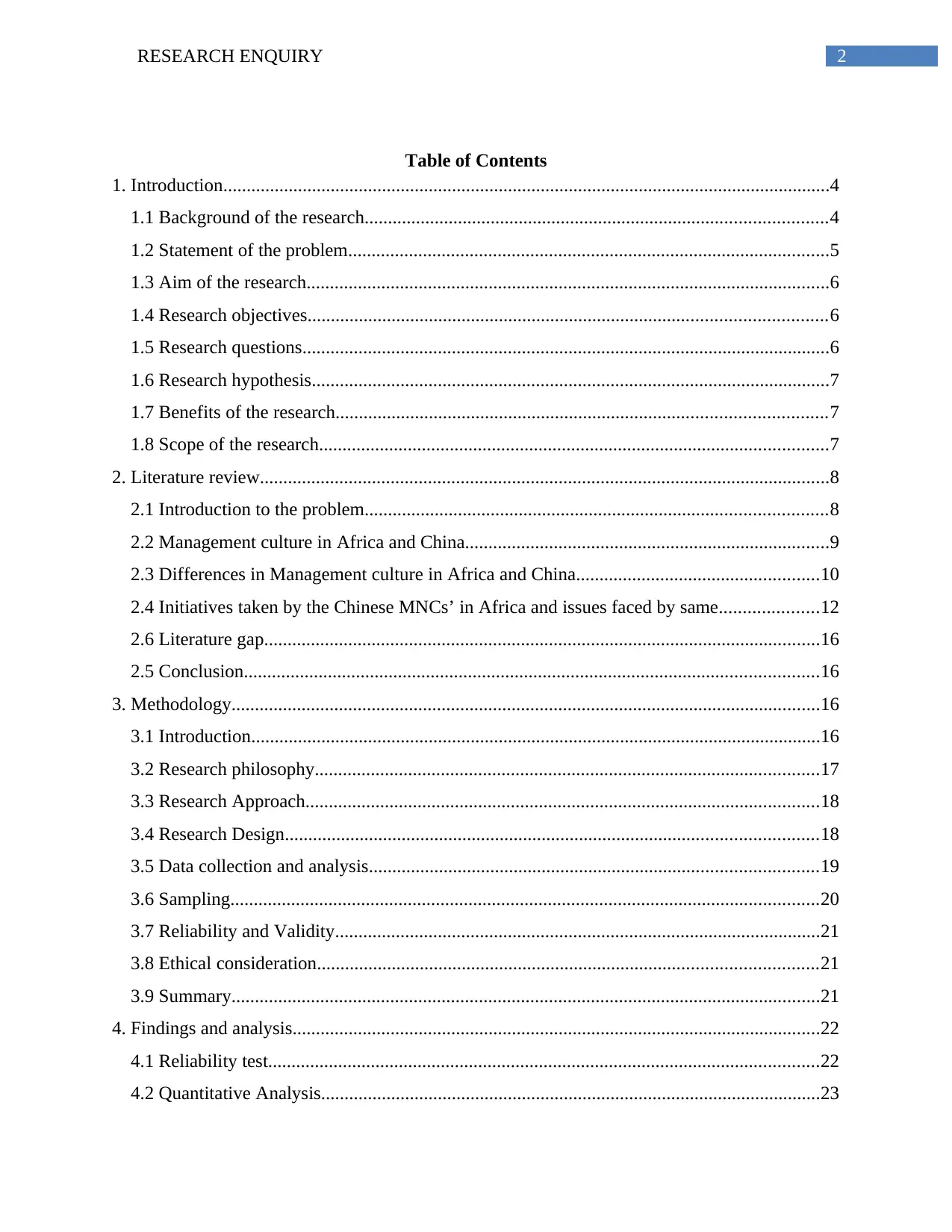
2RESEARCH ENQUIRY
Table of Contents
1. Introduction..................................................................................................................................4
1.1 Background of the research...................................................................................................4
1.2 Statement of the problem.......................................................................................................5
1.3 Aim of the research................................................................................................................6
1.4 Research objectives...............................................................................................................6
1.5 Research questions.................................................................................................................6
1.6 Research hypothesis...............................................................................................................7
1.7 Benefits of the research.........................................................................................................7
1.8 Scope of the research.............................................................................................................7
2. Literature review..........................................................................................................................8
2.1 Introduction to the problem...................................................................................................8
2.2 Management culture in Africa and China..............................................................................9
2.3 Differences in Management culture in Africa and China....................................................10
2.4 Initiatives taken by the Chinese MNCs’ in Africa and issues faced by same.....................12
2.6 Literature gap.......................................................................................................................16
2.5 Conclusion...........................................................................................................................16
3. Methodology..............................................................................................................................16
3.1 Introduction..........................................................................................................................16
3.2 Research philosophy............................................................................................................17
3.3 Research Approach..............................................................................................................18
3.4 Research Design..................................................................................................................18
3.5 Data collection and analysis................................................................................................19
3.6 Sampling..............................................................................................................................20
3.7 Reliability and Validity........................................................................................................21
3.8 Ethical consideration...........................................................................................................21
3.9 Summary..............................................................................................................................21
4. Findings and analysis.................................................................................................................22
4.1 Reliability test......................................................................................................................22
4.2 Quantitative Analysis...........................................................................................................23
Table of Contents
1. Introduction..................................................................................................................................4
1.1 Background of the research...................................................................................................4
1.2 Statement of the problem.......................................................................................................5
1.3 Aim of the research................................................................................................................6
1.4 Research objectives...............................................................................................................6
1.5 Research questions.................................................................................................................6
1.6 Research hypothesis...............................................................................................................7
1.7 Benefits of the research.........................................................................................................7
1.8 Scope of the research.............................................................................................................7
2. Literature review..........................................................................................................................8
2.1 Introduction to the problem...................................................................................................8
2.2 Management culture in Africa and China..............................................................................9
2.3 Differences in Management culture in Africa and China....................................................10
2.4 Initiatives taken by the Chinese MNCs’ in Africa and issues faced by same.....................12
2.6 Literature gap.......................................................................................................................16
2.5 Conclusion...........................................................................................................................16
3. Methodology..............................................................................................................................16
3.1 Introduction..........................................................................................................................16
3.2 Research philosophy............................................................................................................17
3.3 Research Approach..............................................................................................................18
3.4 Research Design..................................................................................................................18
3.5 Data collection and analysis................................................................................................19
3.6 Sampling..............................................................................................................................20
3.7 Reliability and Validity........................................................................................................21
3.8 Ethical consideration...........................................................................................................21
3.9 Summary..............................................................................................................................21
4. Findings and analysis.................................................................................................................22
4.1 Reliability test......................................................................................................................22
4.2 Quantitative Analysis...........................................................................................................23
⊘ This is a preview!⊘
Do you want full access?
Subscribe today to unlock all pages.

Trusted by 1+ million students worldwide
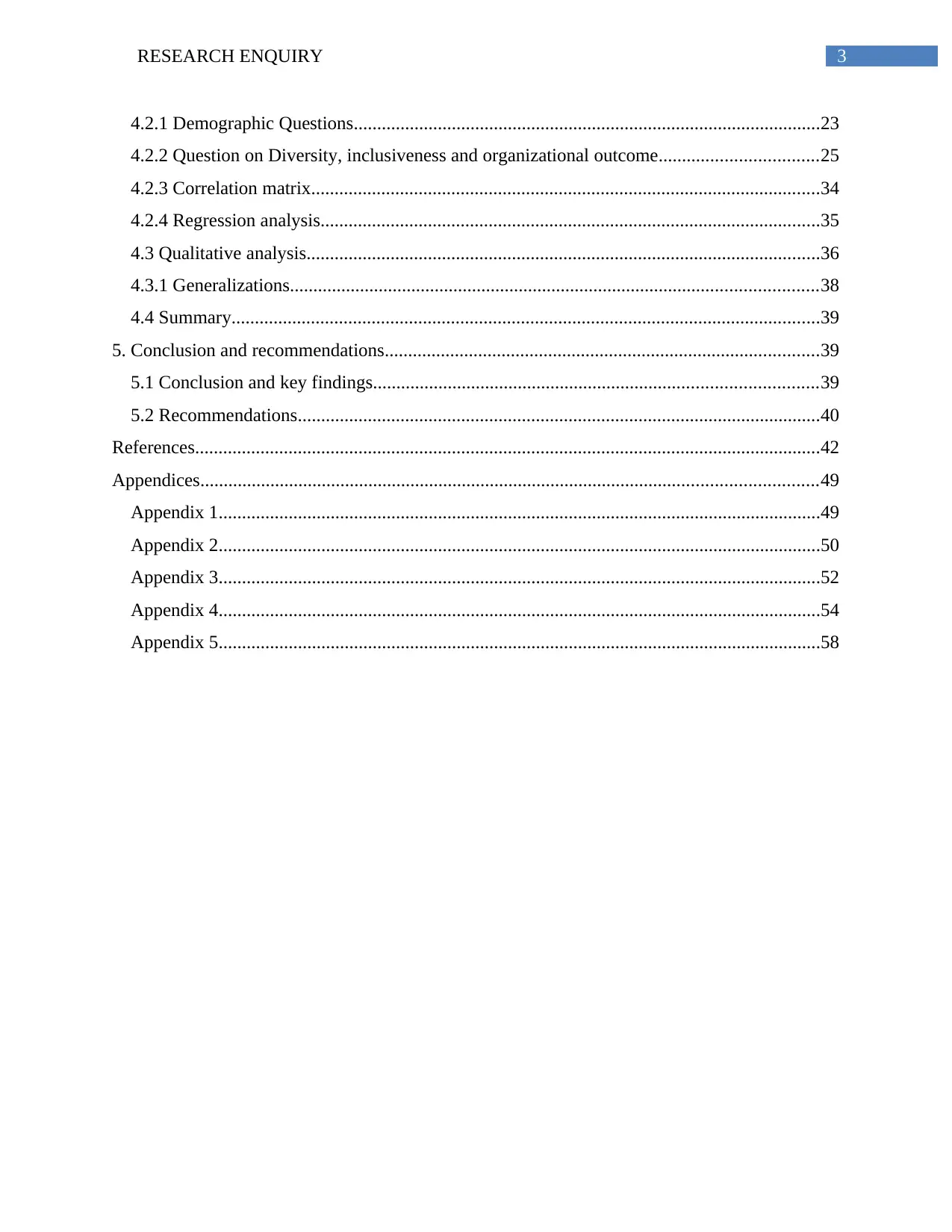
3RESEARCH ENQUIRY
4.2.1 Demographic Questions....................................................................................................23
4.2.2 Question on Diversity, inclusiveness and organizational outcome..................................25
4.2.3 Correlation matrix.............................................................................................................34
4.2.4 Regression analysis...........................................................................................................35
4.3 Qualitative analysis..............................................................................................................36
4.3.1 Generalizations.................................................................................................................38
4.4 Summary..............................................................................................................................39
5. Conclusion and recommendations.............................................................................................39
5.1 Conclusion and key findings...............................................................................................39
5.2 Recommendations................................................................................................................40
References......................................................................................................................................42
Appendices....................................................................................................................................49
Appendix 1.................................................................................................................................49
Appendix 2.................................................................................................................................50
Appendix 3.................................................................................................................................52
Appendix 4.................................................................................................................................54
Appendix 5.................................................................................................................................58
4.2.1 Demographic Questions....................................................................................................23
4.2.2 Question on Diversity, inclusiveness and organizational outcome..................................25
4.2.3 Correlation matrix.............................................................................................................34
4.2.4 Regression analysis...........................................................................................................35
4.3 Qualitative analysis..............................................................................................................36
4.3.1 Generalizations.................................................................................................................38
4.4 Summary..............................................................................................................................39
5. Conclusion and recommendations.............................................................................................39
5.1 Conclusion and key findings...............................................................................................39
5.2 Recommendations................................................................................................................40
References......................................................................................................................................42
Appendices....................................................................................................................................49
Appendix 1.................................................................................................................................49
Appendix 2.................................................................................................................................50
Appendix 3.................................................................................................................................52
Appendix 4.................................................................................................................................54
Appendix 5.................................................................................................................................58
Paraphrase This Document
Need a fresh take? Get an instant paraphrase of this document with our AI Paraphraser
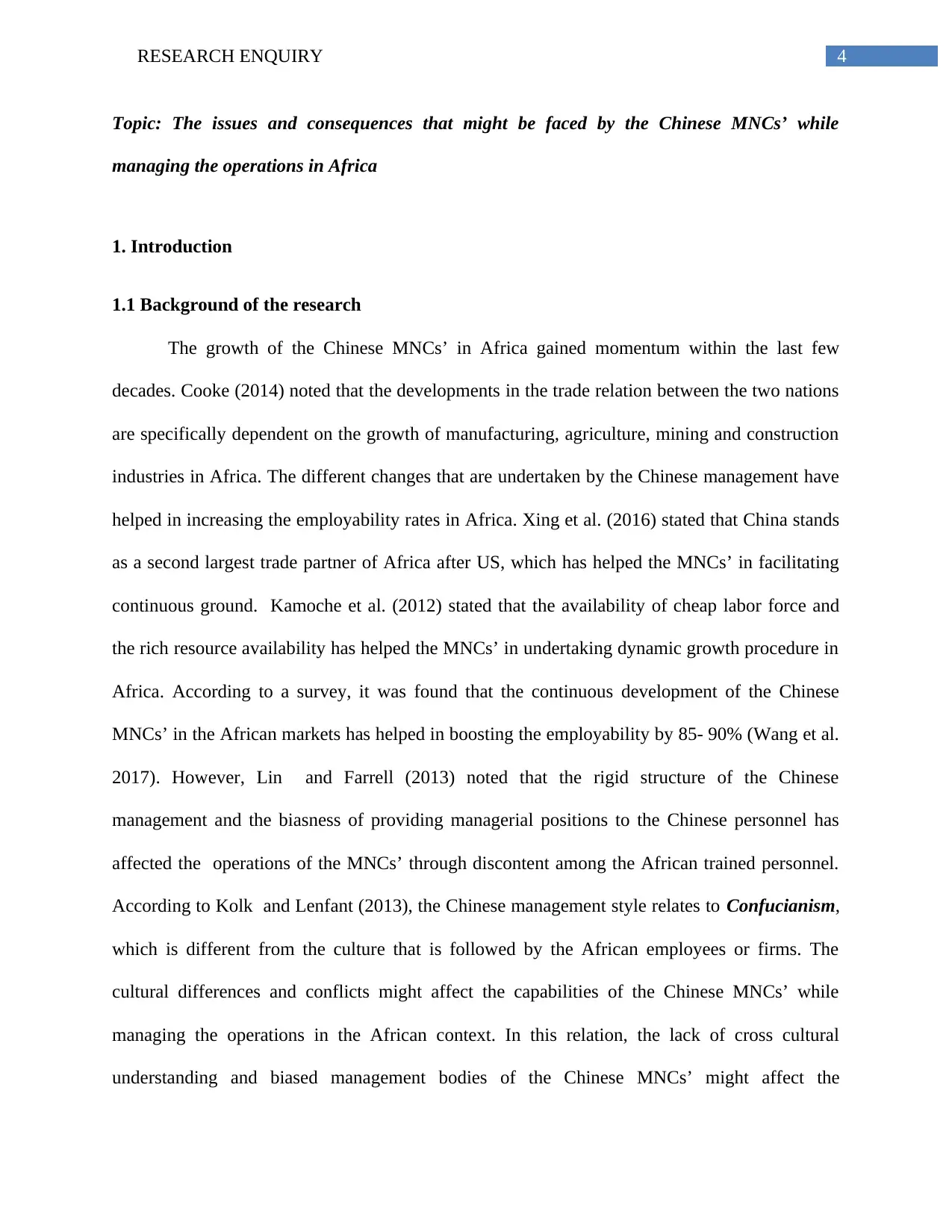
4RESEARCH ENQUIRY
Topic: The issues and consequences that might be faced by the Chinese MNCs’ while
managing the operations in Africa
1. Introduction
1.1 Background of the research
The growth of the Chinese MNCs’ in Africa gained momentum within the last few
decades. Cooke (2014) noted that the developments in the trade relation between the two nations
are specifically dependent on the growth of manufacturing, agriculture, mining and construction
industries in Africa. The different changes that are undertaken by the Chinese management have
helped in increasing the employability rates in Africa. Xing et al. (2016) stated that China stands
as a second largest trade partner of Africa after US, which has helped the MNCs’ in facilitating
continuous ground. Kamoche et al. (2012) stated that the availability of cheap labor force and
the rich resource availability has helped the MNCs’ in undertaking dynamic growth procedure in
Africa. According to a survey, it was found that the continuous development of the Chinese
MNCs’ in the African markets has helped in boosting the employability by 85- 90% (Wang et al.
2017). However, Lin and Farrell (2013) noted that the rigid structure of the Chinese
management and the biasness of providing managerial positions to the Chinese personnel has
affected the operations of the MNCs’ through discontent among the African trained personnel.
According to Kolk and Lenfant (2013), the Chinese management style relates to Confucianism,
which is different from the culture that is followed by the African employees or firms. The
cultural differences and conflicts might affect the capabilities of the Chinese MNCs’ while
managing the operations in the African context. In this relation, the lack of cross cultural
understanding and biased management bodies of the Chinese MNCs’ might affect the
Topic: The issues and consequences that might be faced by the Chinese MNCs’ while
managing the operations in Africa
1. Introduction
1.1 Background of the research
The growth of the Chinese MNCs’ in Africa gained momentum within the last few
decades. Cooke (2014) noted that the developments in the trade relation between the two nations
are specifically dependent on the growth of manufacturing, agriculture, mining and construction
industries in Africa. The different changes that are undertaken by the Chinese management have
helped in increasing the employability rates in Africa. Xing et al. (2016) stated that China stands
as a second largest trade partner of Africa after US, which has helped the MNCs’ in facilitating
continuous ground. Kamoche et al. (2012) stated that the availability of cheap labor force and
the rich resource availability has helped the MNCs’ in undertaking dynamic growth procedure in
Africa. According to a survey, it was found that the continuous development of the Chinese
MNCs’ in the African markets has helped in boosting the employability by 85- 90% (Wang et al.
2017). However, Lin and Farrell (2013) noted that the rigid structure of the Chinese
management and the biasness of providing managerial positions to the Chinese personnel has
affected the operations of the MNCs’ through discontent among the African trained personnel.
According to Kolk and Lenfant (2013), the Chinese management style relates to Confucianism,
which is different from the culture that is followed by the African employees or firms. The
cultural differences and conflicts might affect the capabilities of the Chinese MNCs’ while
managing the operations in the African context. In this relation, the lack of cross cultural
understanding and biased management bodies of the Chinese MNCs’ might affect the
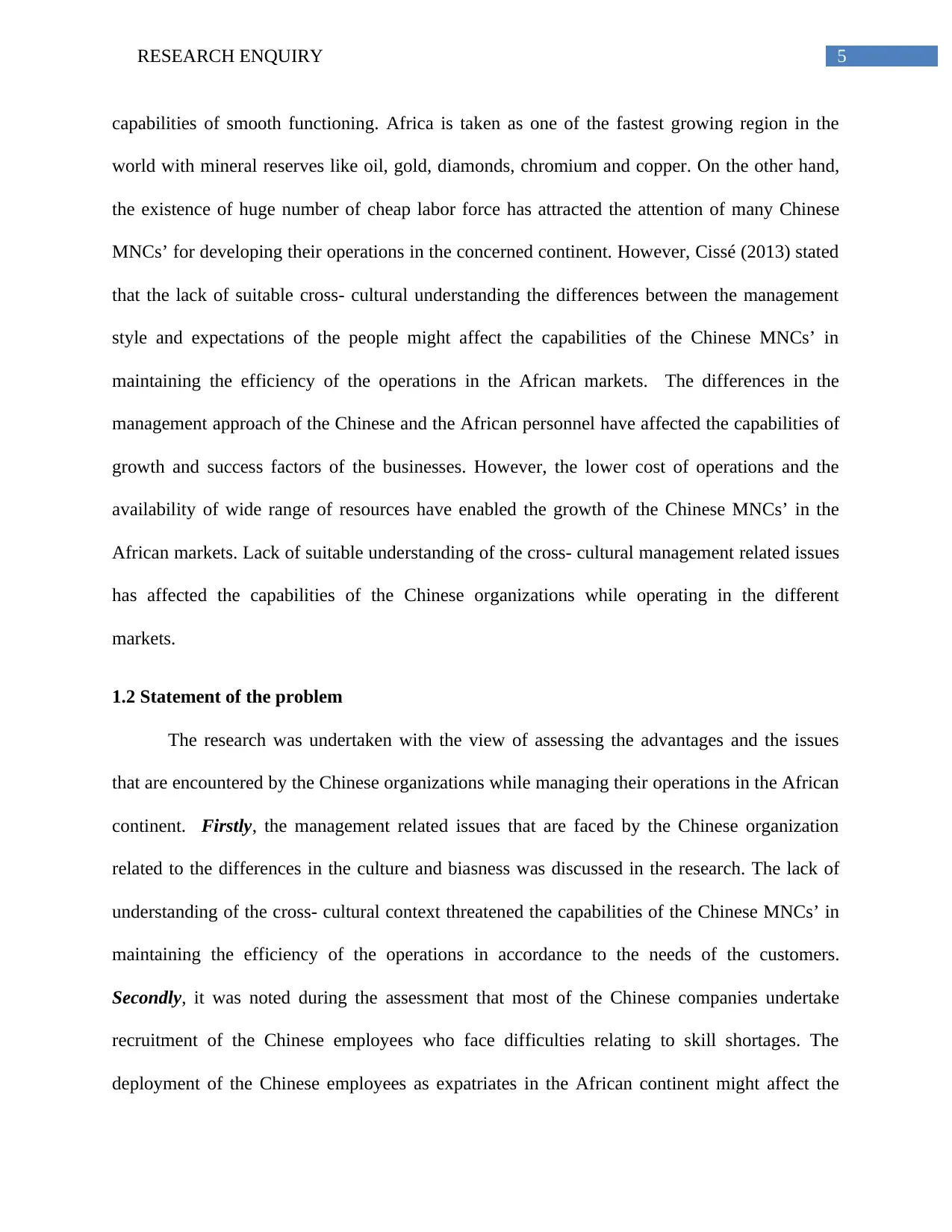
5RESEARCH ENQUIRY
capabilities of smooth functioning. Africa is taken as one of the fastest growing region in the
world with mineral reserves like oil, gold, diamonds, chromium and copper. On the other hand,
the existence of huge number of cheap labor force has attracted the attention of many Chinese
MNCs’ for developing their operations in the concerned continent. However, Cissé (2013) stated
that the lack of suitable cross- cultural understanding the differences between the management
style and expectations of the people might affect the capabilities of the Chinese MNCs’ in
maintaining the efficiency of the operations in the African markets. The differences in the
management approach of the Chinese and the African personnel have affected the capabilities of
growth and success factors of the businesses. However, the lower cost of operations and the
availability of wide range of resources have enabled the growth of the Chinese MNCs’ in the
African markets. Lack of suitable understanding of the cross- cultural management related issues
has affected the capabilities of the Chinese organizations while operating in the different
markets.
1.2 Statement of the problem
The research was undertaken with the view of assessing the advantages and the issues
that are encountered by the Chinese organizations while managing their operations in the African
continent. Firstly, the management related issues that are faced by the Chinese organization
related to the differences in the culture and biasness was discussed in the research. The lack of
understanding of the cross- cultural context threatened the capabilities of the Chinese MNCs’ in
maintaining the efficiency of the operations in accordance to the needs of the customers.
Secondly, it was noted during the assessment that most of the Chinese companies undertake
recruitment of the Chinese employees who face difficulties relating to skill shortages. The
deployment of the Chinese employees as expatriates in the African continent might affect the
capabilities of smooth functioning. Africa is taken as one of the fastest growing region in the
world with mineral reserves like oil, gold, diamonds, chromium and copper. On the other hand,
the existence of huge number of cheap labor force has attracted the attention of many Chinese
MNCs’ for developing their operations in the concerned continent. However, Cissé (2013) stated
that the lack of suitable cross- cultural understanding the differences between the management
style and expectations of the people might affect the capabilities of the Chinese MNCs’ in
maintaining the efficiency of the operations in the African markets. The differences in the
management approach of the Chinese and the African personnel have affected the capabilities of
growth and success factors of the businesses. However, the lower cost of operations and the
availability of wide range of resources have enabled the growth of the Chinese MNCs’ in the
African markets. Lack of suitable understanding of the cross- cultural management related issues
has affected the capabilities of the Chinese organizations while operating in the different
markets.
1.2 Statement of the problem
The research was undertaken with the view of assessing the advantages and the issues
that are encountered by the Chinese organizations while managing their operations in the African
continent. Firstly, the management related issues that are faced by the Chinese organization
related to the differences in the culture and biasness was discussed in the research. The lack of
understanding of the cross- cultural context threatened the capabilities of the Chinese MNCs’ in
maintaining the efficiency of the operations in accordance to the needs of the customers.
Secondly, it was noted during the assessment that most of the Chinese companies undertake
recruitment of the Chinese employees who face difficulties relating to skill shortages. The
deployment of the Chinese employees as expatriates in the African continent might affect the
⊘ This is a preview!⊘
Do you want full access?
Subscribe today to unlock all pages.

Trusted by 1+ million students worldwide
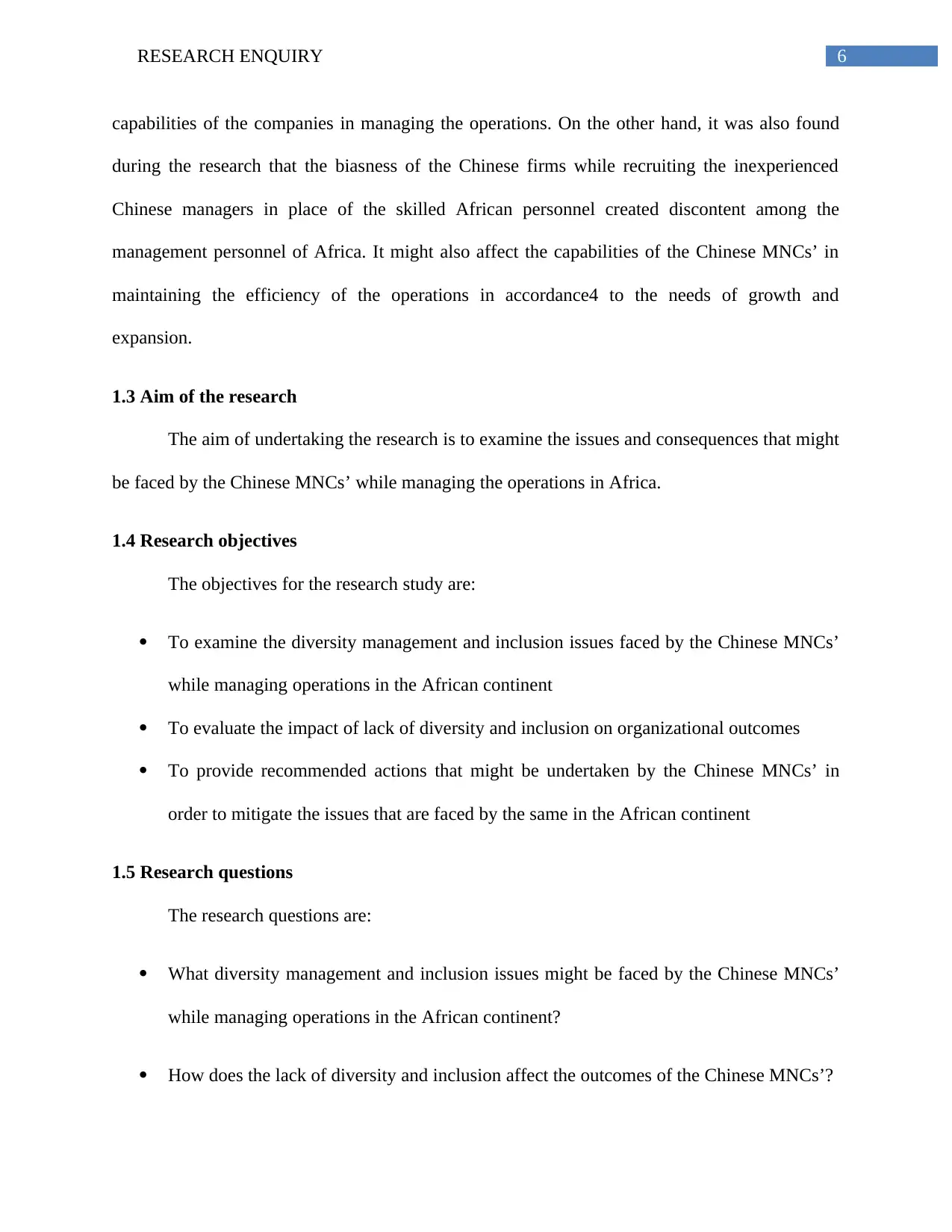
6RESEARCH ENQUIRY
capabilities of the companies in managing the operations. On the other hand, it was also found
during the research that the biasness of the Chinese firms while recruiting the inexperienced
Chinese managers in place of the skilled African personnel created discontent among the
management personnel of Africa. It might also affect the capabilities of the Chinese MNCs’ in
maintaining the efficiency of the operations in accordance4 to the needs of growth and
expansion.
1.3 Aim of the research
The aim of undertaking the research is to examine the issues and consequences that might
be faced by the Chinese MNCs’ while managing the operations in Africa.
1.4 Research objectives
The objectives for the research study are:
To examine the diversity management and inclusion issues faced by the Chinese MNCs’
while managing operations in the African continent
To evaluate the impact of lack of diversity and inclusion on organizational outcomes
To provide recommended actions that might be undertaken by the Chinese MNCs’ in
order to mitigate the issues that are faced by the same in the African continent
1.5 Research questions
The research questions are:
What diversity management and inclusion issues might be faced by the Chinese MNCs’
while managing operations in the African continent?
How does the lack of diversity and inclusion affect the outcomes of the Chinese MNCs’?
capabilities of the companies in managing the operations. On the other hand, it was also found
during the research that the biasness of the Chinese firms while recruiting the inexperienced
Chinese managers in place of the skilled African personnel created discontent among the
management personnel of Africa. It might also affect the capabilities of the Chinese MNCs’ in
maintaining the efficiency of the operations in accordance4 to the needs of growth and
expansion.
1.3 Aim of the research
The aim of undertaking the research is to examine the issues and consequences that might
be faced by the Chinese MNCs’ while managing the operations in Africa.
1.4 Research objectives
The objectives for the research study are:
To examine the diversity management and inclusion issues faced by the Chinese MNCs’
while managing operations in the African continent
To evaluate the impact of lack of diversity and inclusion on organizational outcomes
To provide recommended actions that might be undertaken by the Chinese MNCs’ in
order to mitigate the issues that are faced by the same in the African continent
1.5 Research questions
The research questions are:
What diversity management and inclusion issues might be faced by the Chinese MNCs’
while managing operations in the African continent?
How does the lack of diversity and inclusion affect the outcomes of the Chinese MNCs’?
Paraphrase This Document
Need a fresh take? Get an instant paraphrase of this document with our AI Paraphraser
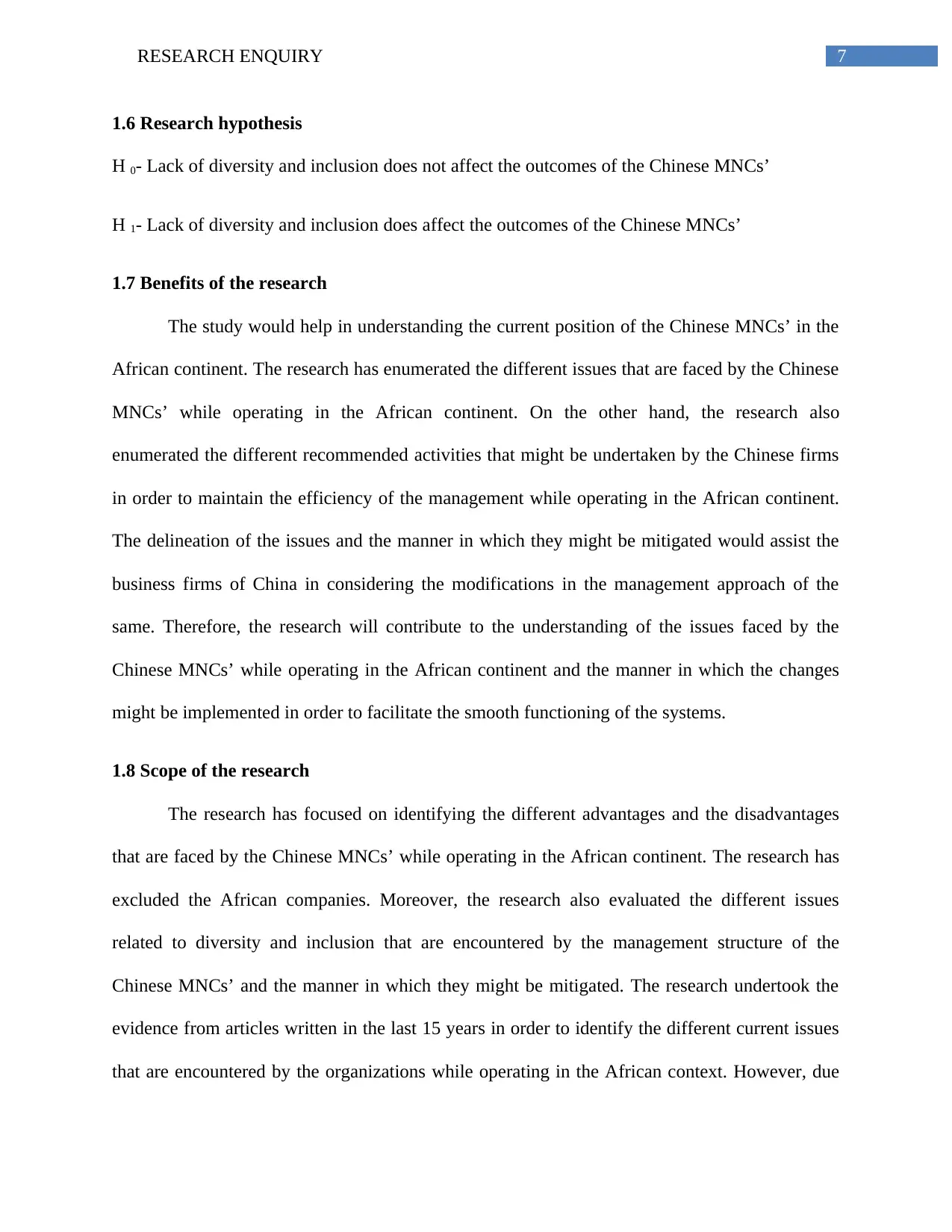
7RESEARCH ENQUIRY
1.6 Research hypothesis
H 0- Lack of diversity and inclusion does not affect the outcomes of the Chinese MNCs’
H 1- Lack of diversity and inclusion does affect the outcomes of the Chinese MNCs’
1.7 Benefits of the research
The study would help in understanding the current position of the Chinese MNCs’ in the
African continent. The research has enumerated the different issues that are faced by the Chinese
MNCs’ while operating in the African continent. On the other hand, the research also
enumerated the different recommended activities that might be undertaken by the Chinese firms
in order to maintain the efficiency of the management while operating in the African continent.
The delineation of the issues and the manner in which they might be mitigated would assist the
business firms of China in considering the modifications in the management approach of the
same. Therefore, the research will contribute to the understanding of the issues faced by the
Chinese MNCs’ while operating in the African continent and the manner in which the changes
might be implemented in order to facilitate the smooth functioning of the systems.
1.8 Scope of the research
The research has focused on identifying the different advantages and the disadvantages
that are faced by the Chinese MNCs’ while operating in the African continent. The research has
excluded the African companies. Moreover, the research also evaluated the different issues
related to diversity and inclusion that are encountered by the management structure of the
Chinese MNCs’ and the manner in which they might be mitigated. The research undertook the
evidence from articles written in the last 15 years in order to identify the different current issues
that are encountered by the organizations while operating in the African context. However, due
1.6 Research hypothesis
H 0- Lack of diversity and inclusion does not affect the outcomes of the Chinese MNCs’
H 1- Lack of diversity and inclusion does affect the outcomes of the Chinese MNCs’
1.7 Benefits of the research
The study would help in understanding the current position of the Chinese MNCs’ in the
African continent. The research has enumerated the different issues that are faced by the Chinese
MNCs’ while operating in the African continent. On the other hand, the research also
enumerated the different recommended activities that might be undertaken by the Chinese firms
in order to maintain the efficiency of the management while operating in the African continent.
The delineation of the issues and the manner in which they might be mitigated would assist the
business firms of China in considering the modifications in the management approach of the
same. Therefore, the research will contribute to the understanding of the issues faced by the
Chinese MNCs’ while operating in the African continent and the manner in which the changes
might be implemented in order to facilitate the smooth functioning of the systems.
1.8 Scope of the research
The research has focused on identifying the different advantages and the disadvantages
that are faced by the Chinese MNCs’ while operating in the African continent. The research has
excluded the African companies. Moreover, the research also evaluated the different issues
related to diversity and inclusion that are encountered by the management structure of the
Chinese MNCs’ and the manner in which they might be mitigated. The research undertook the
evidence from articles written in the last 15 years in order to identify the different current issues
that are encountered by the organizations while operating in the African context. However, due
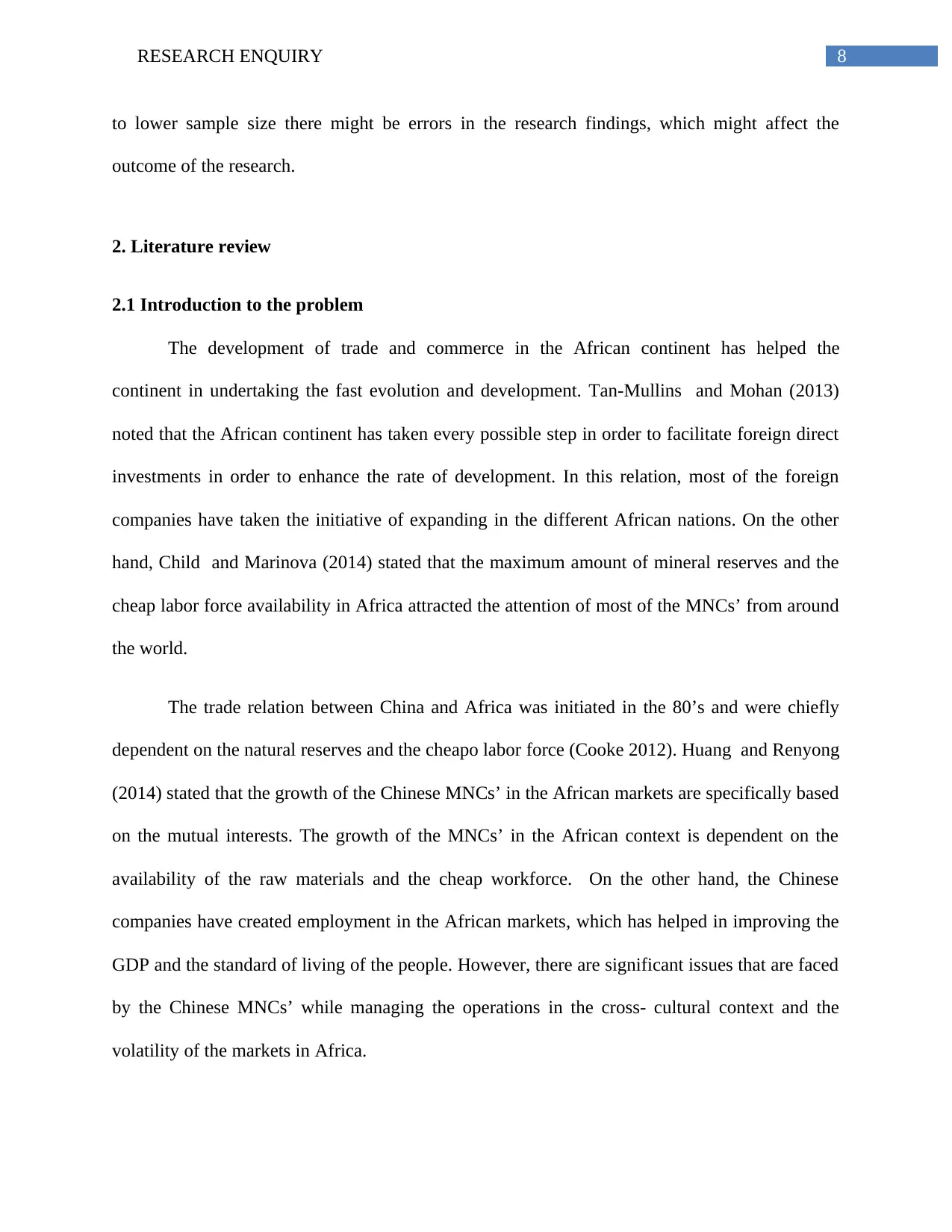
8RESEARCH ENQUIRY
to lower sample size there might be errors in the research findings, which might affect the
outcome of the research.
2. Literature review
2.1 Introduction to the problem
The development of trade and commerce in the African continent has helped the
continent in undertaking the fast evolution and development. Tan-Mullins and Mohan (2013)
noted that the African continent has taken every possible step in order to facilitate foreign direct
investments in order to enhance the rate of development. In this relation, most of the foreign
companies have taken the initiative of expanding in the different African nations. On the other
hand, Child and Marinova (2014) stated that the maximum amount of mineral reserves and the
cheap labor force availability in Africa attracted the attention of most of the MNCs’ from around
the world.
The trade relation between China and Africa was initiated in the 80’s and were chiefly
dependent on the natural reserves and the cheapo labor force (Cooke 2012). Huang and Renyong
(2014) stated that the growth of the Chinese MNCs’ in the African markets are specifically based
on the mutual interests. The growth of the MNCs’ in the African context is dependent on the
availability of the raw materials and the cheap workforce. On the other hand, the Chinese
companies have created employment in the African markets, which has helped in improving the
GDP and the standard of living of the people. However, there are significant issues that are faced
by the Chinese MNCs’ while managing the operations in the cross- cultural context and the
volatility of the markets in Africa.
to lower sample size there might be errors in the research findings, which might affect the
outcome of the research.
2. Literature review
2.1 Introduction to the problem
The development of trade and commerce in the African continent has helped the
continent in undertaking the fast evolution and development. Tan-Mullins and Mohan (2013)
noted that the African continent has taken every possible step in order to facilitate foreign direct
investments in order to enhance the rate of development. In this relation, most of the foreign
companies have taken the initiative of expanding in the different African nations. On the other
hand, Child and Marinova (2014) stated that the maximum amount of mineral reserves and the
cheap labor force availability in Africa attracted the attention of most of the MNCs’ from around
the world.
The trade relation between China and Africa was initiated in the 80’s and were chiefly
dependent on the natural reserves and the cheapo labor force (Cooke 2012). Huang and Renyong
(2014) stated that the growth of the Chinese MNCs’ in the African markets are specifically based
on the mutual interests. The growth of the MNCs’ in the African context is dependent on the
availability of the raw materials and the cheap workforce. On the other hand, the Chinese
companies have created employment in the African markets, which has helped in improving the
GDP and the standard of living of the people. However, there are significant issues that are faced
by the Chinese MNCs’ while managing the operations in the cross- cultural context and the
volatility of the markets in Africa.
⊘ This is a preview!⊘
Do you want full access?
Subscribe today to unlock all pages.

Trusted by 1+ million students worldwide
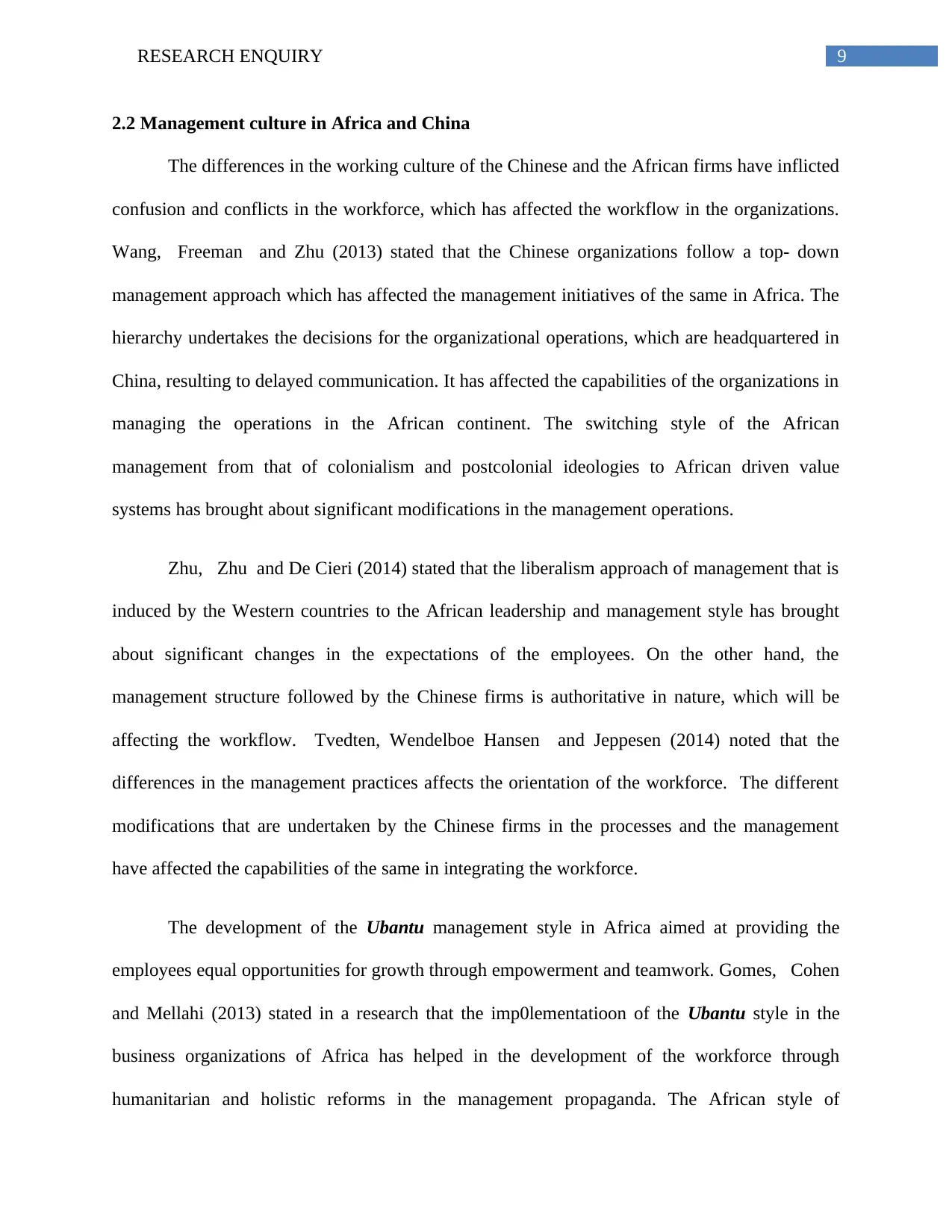
9RESEARCH ENQUIRY
2.2 Management culture in Africa and China
The differences in the working culture of the Chinese and the African firms have inflicted
confusion and conflicts in the workforce, which has affected the workflow in the organizations.
Wang, Freeman and Zhu (2013) stated that the Chinese organizations follow a top- down
management approach which has affected the management initiatives of the same in Africa. The
hierarchy undertakes the decisions for the organizational operations, which are headquartered in
China, resulting to delayed communication. It has affected the capabilities of the organizations in
managing the operations in the African continent. The switching style of the African
management from that of colonialism and postcolonial ideologies to African driven value
systems has brought about significant modifications in the management operations.
Zhu, Zhu and De Cieri (2014) stated that the liberalism approach of management that is
induced by the Western countries to the African leadership and management style has brought
about significant changes in the expectations of the employees. On the other hand, the
management structure followed by the Chinese firms is authoritative in nature, which will be
affecting the workflow. Tvedten, Wendelboe Hansen and Jeppesen (2014) noted that the
differences in the management practices affects the orientation of the workforce. The different
modifications that are undertaken by the Chinese firms in the processes and the management
have affected the capabilities of the same in integrating the workforce.
The development of the Ubantu management style in Africa aimed at providing the
employees equal opportunities for growth through empowerment and teamwork. Gomes, Cohen
and Mellahi (2013) stated in a research that the imp0lementatioon of the Ubantu style in the
business organizations of Africa has helped in the development of the workforce through
humanitarian and holistic reforms in the management propaganda. The African style of
2.2 Management culture in Africa and China
The differences in the working culture of the Chinese and the African firms have inflicted
confusion and conflicts in the workforce, which has affected the workflow in the organizations.
Wang, Freeman and Zhu (2013) stated that the Chinese organizations follow a top- down
management approach which has affected the management initiatives of the same in Africa. The
hierarchy undertakes the decisions for the organizational operations, which are headquartered in
China, resulting to delayed communication. It has affected the capabilities of the organizations in
managing the operations in the African continent. The switching style of the African
management from that of colonialism and postcolonial ideologies to African driven value
systems has brought about significant modifications in the management operations.
Zhu, Zhu and De Cieri (2014) stated that the liberalism approach of management that is
induced by the Western countries to the African leadership and management style has brought
about significant changes in the expectations of the employees. On the other hand, the
management structure followed by the Chinese firms is authoritative in nature, which will be
affecting the workflow. Tvedten, Wendelboe Hansen and Jeppesen (2014) noted that the
differences in the management practices affects the orientation of the workforce. The different
modifications that are undertaken by the Chinese firms in the processes and the management
have affected the capabilities of the same in integrating the workforce.
The development of the Ubantu management style in Africa aimed at providing the
employees equal opportunities for growth through empowerment and teamwork. Gomes, Cohen
and Mellahi (2013) stated in a research that the imp0lementatioon of the Ubantu style in the
business organizations of Africa has helped in the development of the workforce through
humanitarian and holistic reforms in the management propaganda. The African style of
Paraphrase This Document
Need a fresh take? Get an instant paraphrase of this document with our AI Paraphraser
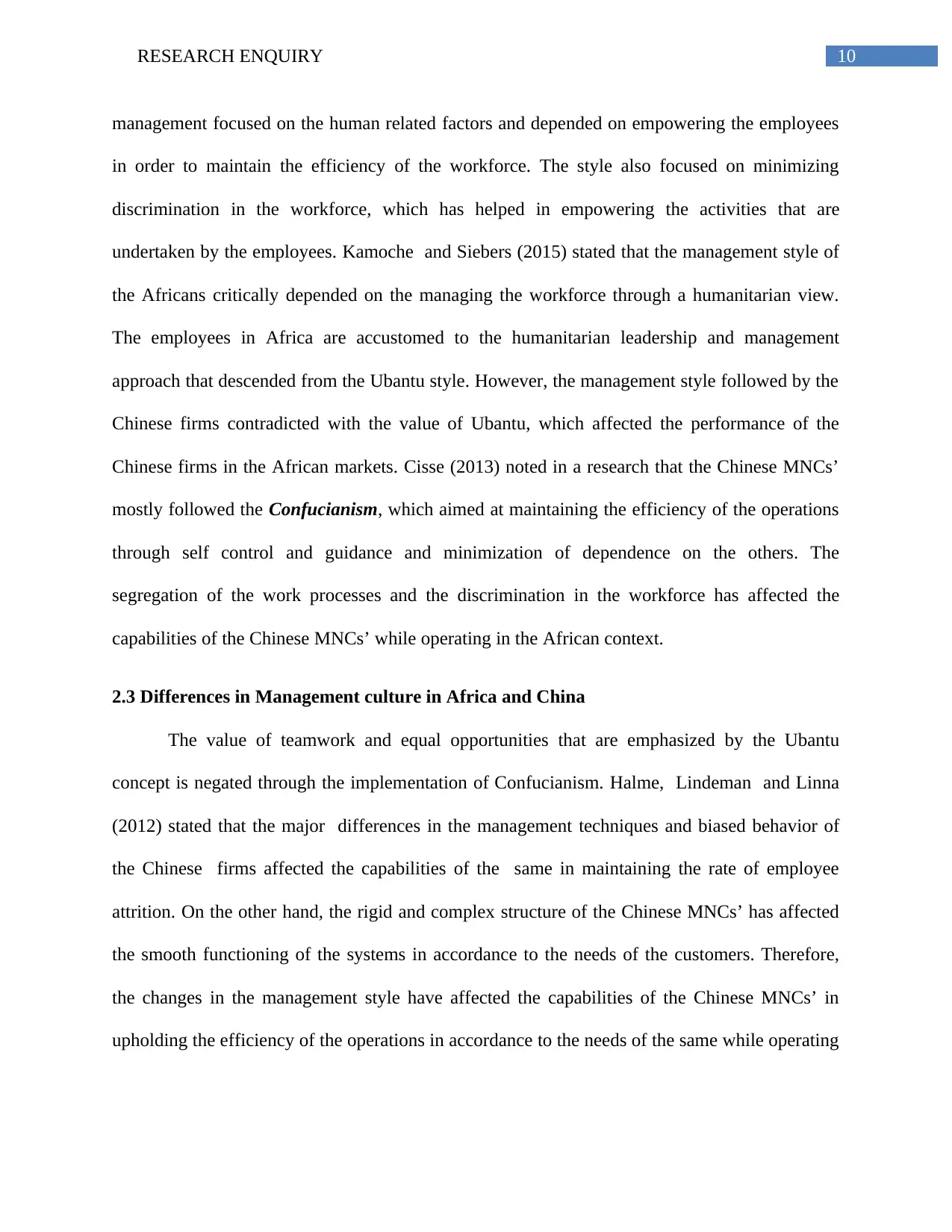
10RESEARCH ENQUIRY
management focused on the human related factors and depended on empowering the employees
in order to maintain the efficiency of the workforce. The style also focused on minimizing
discrimination in the workforce, which has helped in empowering the activities that are
undertaken by the employees. Kamoche and Siebers (2015) stated that the management style of
the Africans critically depended on the managing the workforce through a humanitarian view.
The employees in Africa are accustomed to the humanitarian leadership and management
approach that descended from the Ubantu style. However, the management style followed by the
Chinese firms contradicted with the value of Ubantu, which affected the performance of the
Chinese firms in the African markets. Cisse (2013) noted in a research that the Chinese MNCs’
mostly followed the Confucianism, which aimed at maintaining the efficiency of the operations
through self control and guidance and minimization of dependence on the others. The
segregation of the work processes and the discrimination in the workforce has affected the
capabilities of the Chinese MNCs’ while operating in the African context.
2.3 Differences in Management culture in Africa and China
The value of teamwork and equal opportunities that are emphasized by the Ubantu
concept is negated through the implementation of Confucianism. Halme, Lindeman and Linna
(2012) stated that the major differences in the management techniques and biased behavior of
the Chinese firms affected the capabilities of the same in maintaining the rate of employee
attrition. On the other hand, the rigid and complex structure of the Chinese MNCs’ has affected
the smooth functioning of the systems in accordance to the needs of the customers. Therefore,
the changes in the management style have affected the capabilities of the Chinese MNCs’ in
upholding the efficiency of the operations in accordance to the needs of the same while operating
management focused on the human related factors and depended on empowering the employees
in order to maintain the efficiency of the workforce. The style also focused on minimizing
discrimination in the workforce, which has helped in empowering the activities that are
undertaken by the employees. Kamoche and Siebers (2015) stated that the management style of
the Africans critically depended on the managing the workforce through a humanitarian view.
The employees in Africa are accustomed to the humanitarian leadership and management
approach that descended from the Ubantu style. However, the management style followed by the
Chinese firms contradicted with the value of Ubantu, which affected the performance of the
Chinese firms in the African markets. Cisse (2013) noted in a research that the Chinese MNCs’
mostly followed the Confucianism, which aimed at maintaining the efficiency of the operations
through self control and guidance and minimization of dependence on the others. The
segregation of the work processes and the discrimination in the workforce has affected the
capabilities of the Chinese MNCs’ while operating in the African context.
2.3 Differences in Management culture in Africa and China
The value of teamwork and equal opportunities that are emphasized by the Ubantu
concept is negated through the implementation of Confucianism. Halme, Lindeman and Linna
(2012) stated that the major differences in the management techniques and biased behavior of
the Chinese firms affected the capabilities of the same in maintaining the rate of employee
attrition. On the other hand, the rigid and complex structure of the Chinese MNCs’ has affected
the smooth functioning of the systems in accordance to the needs of the customers. Therefore,
the changes in the management style have affected the capabilities of the Chinese MNCs’ in
upholding the efficiency of the operations in accordance to the needs of the same while operating
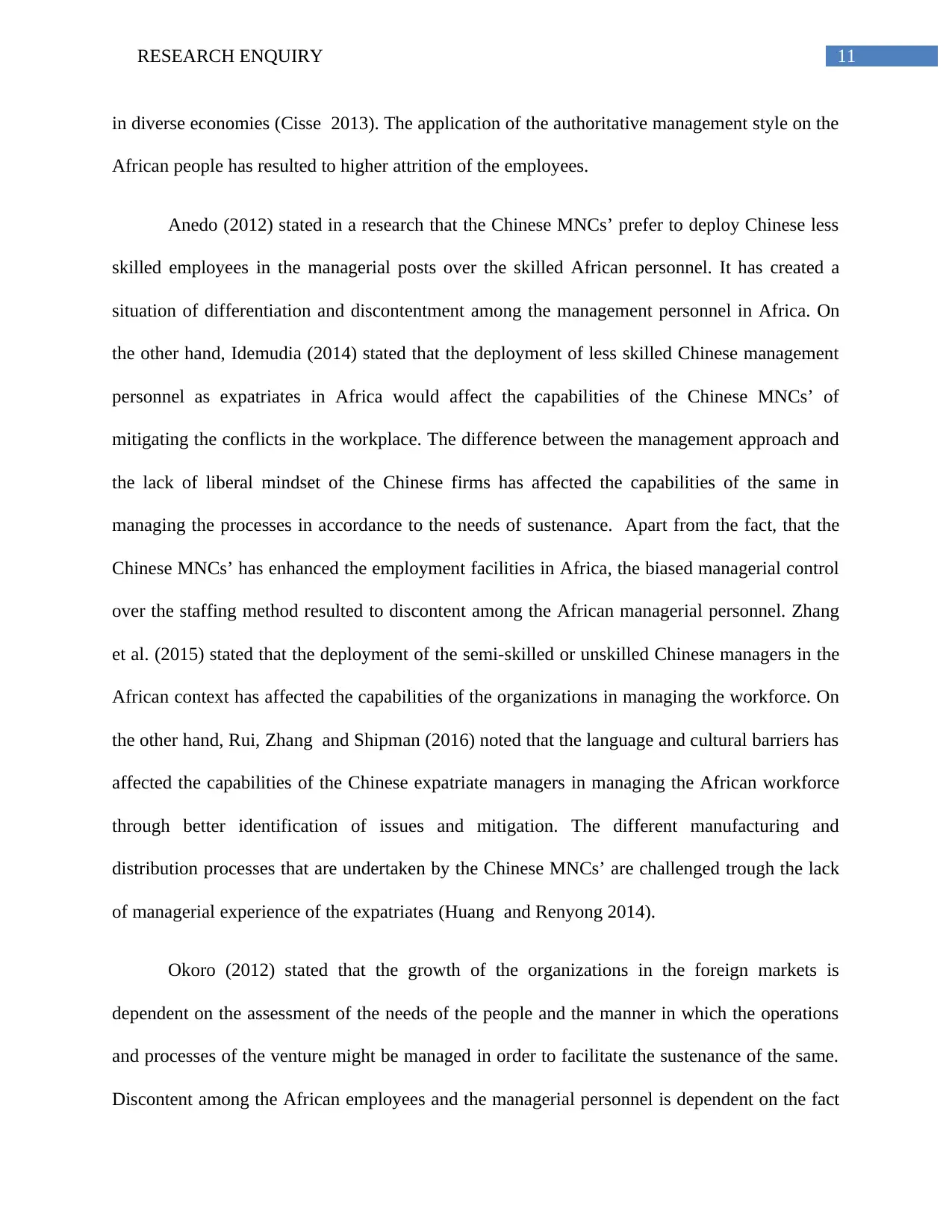
11RESEARCH ENQUIRY
in diverse economies (Cisse 2013). The application of the authoritative management style on the
African people has resulted to higher attrition of the employees.
Anedo (2012) stated in a research that the Chinese MNCs’ prefer to deploy Chinese less
skilled employees in the managerial posts over the skilled African personnel. It has created a
situation of differentiation and discontentment among the management personnel in Africa. On
the other hand, Idemudia (2014) stated that the deployment of less skilled Chinese management
personnel as expatriates in Africa would affect the capabilities of the Chinese MNCs’ of
mitigating the conflicts in the workplace. The difference between the management approach and
the lack of liberal mindset of the Chinese firms has affected the capabilities of the same in
managing the processes in accordance to the needs of sustenance. Apart from the fact, that the
Chinese MNCs’ has enhanced the employment facilities in Africa, the biased managerial control
over the staffing method resulted to discontent among the African managerial personnel. Zhang
et al. (2015) stated that the deployment of the semi-skilled or unskilled Chinese managers in the
African context has affected the capabilities of the organizations in managing the workforce. On
the other hand, Rui, Zhang and Shipman (2016) noted that the language and cultural barriers has
affected the capabilities of the Chinese expatriate managers in managing the African workforce
through better identification of issues and mitigation. The different manufacturing and
distribution processes that are undertaken by the Chinese MNCs’ are challenged trough the lack
of managerial experience of the expatriates (Huang and Renyong 2014).
Okoro (2012) stated that the growth of the organizations in the foreign markets is
dependent on the assessment of the needs of the people and the manner in which the operations
and processes of the venture might be managed in order to facilitate the sustenance of the same.
Discontent among the African employees and the managerial personnel is dependent on the fact
in diverse economies (Cisse 2013). The application of the authoritative management style on the
African people has resulted to higher attrition of the employees.
Anedo (2012) stated in a research that the Chinese MNCs’ prefer to deploy Chinese less
skilled employees in the managerial posts over the skilled African personnel. It has created a
situation of differentiation and discontentment among the management personnel in Africa. On
the other hand, Idemudia (2014) stated that the deployment of less skilled Chinese management
personnel as expatriates in Africa would affect the capabilities of the Chinese MNCs’ of
mitigating the conflicts in the workplace. The difference between the management approach and
the lack of liberal mindset of the Chinese firms has affected the capabilities of the same in
managing the processes in accordance to the needs of sustenance. Apart from the fact, that the
Chinese MNCs’ has enhanced the employment facilities in Africa, the biased managerial control
over the staffing method resulted to discontent among the African managerial personnel. Zhang
et al. (2015) stated that the deployment of the semi-skilled or unskilled Chinese managers in the
African context has affected the capabilities of the organizations in managing the workforce. On
the other hand, Rui, Zhang and Shipman (2016) noted that the language and cultural barriers has
affected the capabilities of the Chinese expatriate managers in managing the African workforce
through better identification of issues and mitigation. The different manufacturing and
distribution processes that are undertaken by the Chinese MNCs’ are challenged trough the lack
of managerial experience of the expatriates (Huang and Renyong 2014).
Okoro (2012) stated that the growth of the organizations in the foreign markets is
dependent on the assessment of the needs of the people and the manner in which the operations
and processes of the venture might be managed in order to facilitate the sustenance of the same.
Discontent among the African employees and the managerial personnel is dependent on the fact
⊘ This is a preview!⊘
Do you want full access?
Subscribe today to unlock all pages.

Trusted by 1+ million students worldwide
1 out of 62
Related Documents
Your All-in-One AI-Powered Toolkit for Academic Success.
+13062052269
info@desklib.com
Available 24*7 on WhatsApp / Email
![[object Object]](/_next/static/media/star-bottom.7253800d.svg)
Unlock your academic potential
Copyright © 2020–2026 A2Z Services. All Rights Reserved. Developed and managed by ZUCOL.




